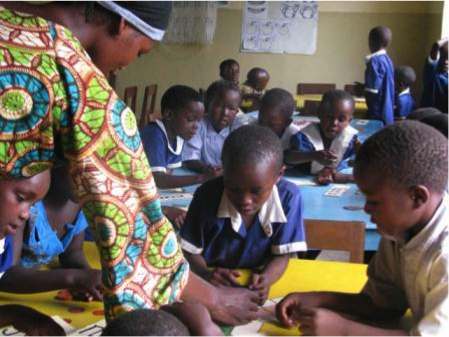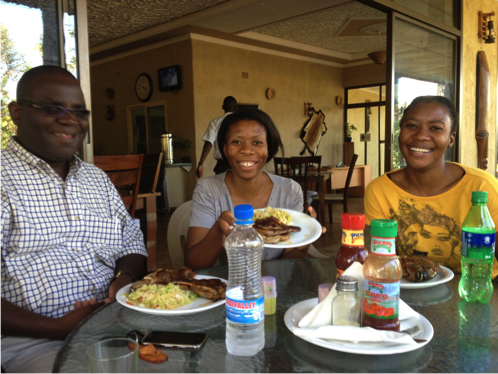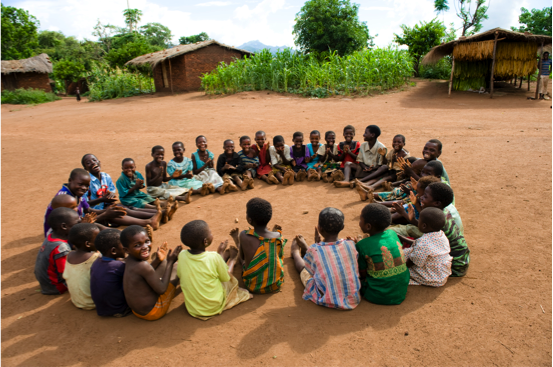One Year Insights: Improving Early Childhood Development in Malawi, Tanzania, and Zambia
It's almost the end of our first year of an initiative to improve the quality of early childhood development programming for children under eight in Malawi, Tanzania and Zambia. The Hilton Foundation funds this initiative. An important part of our plan included identifying outstanding Lead Partners in each country who would each then mentor five community organizations to help them improve their early childhood development or ECD programs. The Lead Partners we chose set their sights high. Their visions drive the work and have been a real inspiration.

On a recent call with our Lead Partners, Mulumbo Early Childhood Care and Development Foundation, Namwera AIDS Coordinating Committee (NACC), and Tanzania Home Economics Association (TAHEA), we heard the results of their assessments of the community organizations they mentor. Each organization completed organizational and program assessments to determine the strengths and weaknesses and to provide a sense of the support needed to best improve the organizations’ growth and impact.
As I listened to our Lead Partners, three key themes emerged through their observations. I was impressed by their enthusiasm to grapple with the issues communities face as they talked about each of them.
Theme one: community organizations often have a narrow understanding of ECD
In most villages, ECD means operating a preschool for children under five to attend during the day as their parents work. Program focus is limited to providing education to young children and nothing more. This means programs are often not holistic, leaving out pieces of nutrition, health, and emotional support for children.
Our Lead Partners are responding to this by helping community organizations build an understanding of the holistic nature of ECD. In other words, helping organizations to understand the needs of the whole child—how they develop cognitively, emotionally and physically. Lead Partner, Mulumbo Early Childhood Care and Development Foundation, sees this as an exciting opportunity to strengthen existing programs for young children, unlocking the potential of communities to know how to care for children in their community. They do this by tapping into local experts in child development who regularly provide trainings to partners in order to help them better understand how children grow, and what role they play in supporting the development of healthy children.
Theme two: community organizations have developed networks, but they are underutilizing these relationships
In discussions with Lead Partner Namwera AIDS Coordinating Committee (NACC), this was found to be a common theme in Malawi. There may be a good working relationship between the ECD center, caregivers in the home and local government, but sometimes the linkages could be improved in order to improve access to services for families and children.
NACC found a case where one organization was not linking to the local government health services. This organization provides growth monitoring at their ECD center on a monthly basis but do not have formal training in how to properly measure weight and height of children. NACC discovered that nearby, a health worker from the ministry was also conducting growth monitoring but under a tree since she did not have a facility to use. Although the community organization had previously tapped into the knowledge of the health worker in initiating growth monitoring at their center, they were underutilizing her skills and ability to provide this service at the center. And the health worker herself could improve her services by utilizing the facilities of the organization. NACC has since supported the organization in strengthening this relationship.
Theme three: organizational structure and function need to be addressed first before looking at program development
Tanzania Home Economics Association (TAHEA), found that many partners were struggling with organizational systems and clarifying roles and responsibilities among staff. Without theses functions in order, the organization would be unable to absorb the support TAHEA had planned on providing in improving the quality of their programs for children.
In response, TAHEA re-structured their support for partner organizations to prioritize addressing organizational development before addressing programs. They have since provided training in financial management to a number of organizations so that they can accurately record expenses in their financial reports to Firelight. Secondly, TAHEA helped organizations tap into the knowledge base of their own community by training them in participatory community mapping. They have since gained an understanding of where to go for assistance from within their own communities.
Approach
Our Lead Partners approach their work with community organizations in a variety of ways. All of them work hard to build a strong working relationship based on trust. It’s challenging to expect an organization to open up about their weaknesses if they don’t trust the person they are opening up to. Lead Partners are uniquely positioned in building trust as they are located in the communities and countries where the organizations operate and they have often struggled with similar issues. They can empathize with their challenges while also providing insight into how they overcame that same hurdle. We choose lead partners for this reason – they’ve been there before and are good mentors for younger organizations.
“We are not visiting the organizations to police them, but we are visiting them to have an opportunity to learn from their work and how we can build based on what they know. It’s like building a good working relationship, so that partners can acknowledge challenges and this takes them feeling comfortable.” – Saeed Wame
Vision for Success
“We want to see the grantees ECD identity, a certain quality that we can say this is an outcome of working together.” Mary Kabati
“ECD partners that move together to lobby government to recognize ECD. We are really going to have a force, a network that’s going to push forward an ECD policy since we don’t currently have one in Zambia.” Muunga Lubinda and Louis Mwewa, Zambia Program Consultant
“To really understand where they are doing well, where they’re not doing well, where else can they tap skills and knowledge apart from us, and also having a group which is willing to share ideas and knowledge on how implement ECD programs and also create that network where the CBOs feeling comfortable going to visit one another.” Saeed Wame
In the coming months, Lead Partners will work with their cohort of five community organizations to develop proposals for year two. Building upon themes from year one, we are excited to see how the Lead Partners plan to increase ECD knowledge, strengthen networks, and improve organizational systems for the purpose of improving lives of young children.




